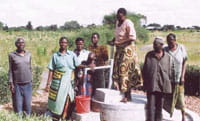After hearing this message from the church, the community was amazed that the church had a plan to work together with them in order to raise the standard of living. The community gave the church permission to facilitate participatory meetings to enable them to understand the root causes of local problems as well as resources that could be used to address them.
Impact
The community now views the church as the ‘community eye’, guiding the community out of darkness which had previously limited people and caused them to be non-literate, spiritually blind, and economically poor. Joseph, one of the community members, was heard saying, ‘If this church hadn’t come to us with this process, I could be dead by now through drunkenness. But through its message shared openly with all of us villagers here, I am safe’.
Since the mobilisation process began, the community feels it has freedom to express its concerns to the church. This gives the church the chance to help the community to find solutions to local needs. In the same way, the church has become transparent to the community, and often meets with the community to share its vision and how it is implementing it.
The work of the church is much more ‘owned’ by church members than it was before, with the guidance of church leaders. Likewise, the development activities in the community are ‘owned’ by community members under the supervision of their selected development and sectoral committees.
When the entire church became more accountable to the community, the work of the local evangelist and pastor became easier and of greater benefit to both the church and the community. The church leaders also became more active and responsible in their work. If they failed to act responsibly, the community could see them as unfit for the job, and begin to demand that they be removed from the leadership!
When the work of the evangelist and pastor became more manageable, effective and efficient, church members became more motivated to serve God and other people. They performed the tasks, not because the pastor said they should, but because the Bible had shown them that they had a role.
Principles of church accountability to the community
From this experience, we can draw some principles of church accountability to the people it is serving:
- The church can be accountable to the community if it understands its role here on earth through listening to God through the Bible. A number of relevant Bible passages are given in the box below.
- The church should share its vision with the community. Allow the community to understand and interpret the church vision. It will be difficult for the community to respond to the church if it fails to understand the church’s vision. Let the vision of the church motivate the community to desire transformation in their lives.
- The church should be willing to take the lead in facilitating the community to understand its situation. Then the church and the community can jointly identify solutions.
- The church should be open to share and participate in addressing the issues facing the community without accusing people in any way. The church should seek to serve the community with love.
Revd Emmanuel Isaya is Church and Community Mobilisation Process Co-ordinator for Shinyanga Diocese.
Email: [email protected]
Church and community mobilisation process
The church and community mobilisation process that was used in Shinyanga Diocese is divided into two parts.
PART 1 Mobilising the church
As many church members as possible are brought together to look at what the Bible says about the church’s mission. It is important that church members have an opportunity to study the Bible for themselves. The church members are therefore divided into groups and a facilitator asks questions about the Bible passage, which church members answer and discuss within their groups. This method is often more effective at motivating people than if the pastor preached the message in a church service.
The Bible studies enable church members to understand the church’s ministry to the community and to develop a vision. The Bible studies also give church members confidence to engage more with the community. Without good relationships, transformation is difficult to achieve.
PART 2 Mobilising the community
The church works with the community to analyse the current situation and develop an action plan for the future. This stage uses participatory techniques and involves:
- describing the current situation in the community
- gathering information about key issues related to daily life
- analysing the information so that a clear decision can be made about the future
- making decisions about how community problems can be addressed, using local resources where possible.
Bible passages that can be used to awaken church members
- God’s purpose for humankind Genesis 1:26-31; 2:8-17; 3:1-24
- God’s vision for his people Isaiah 65:17-25
- Pictures of the church 1 Peter 2:4-12
- Ministry of Jesus Matthew 3:1-2; 4:17, 23-25; 9:35-38
- The church as salt and light of the world Matthew 5:13-16
- The good Samaritan Luke 10:25-37









